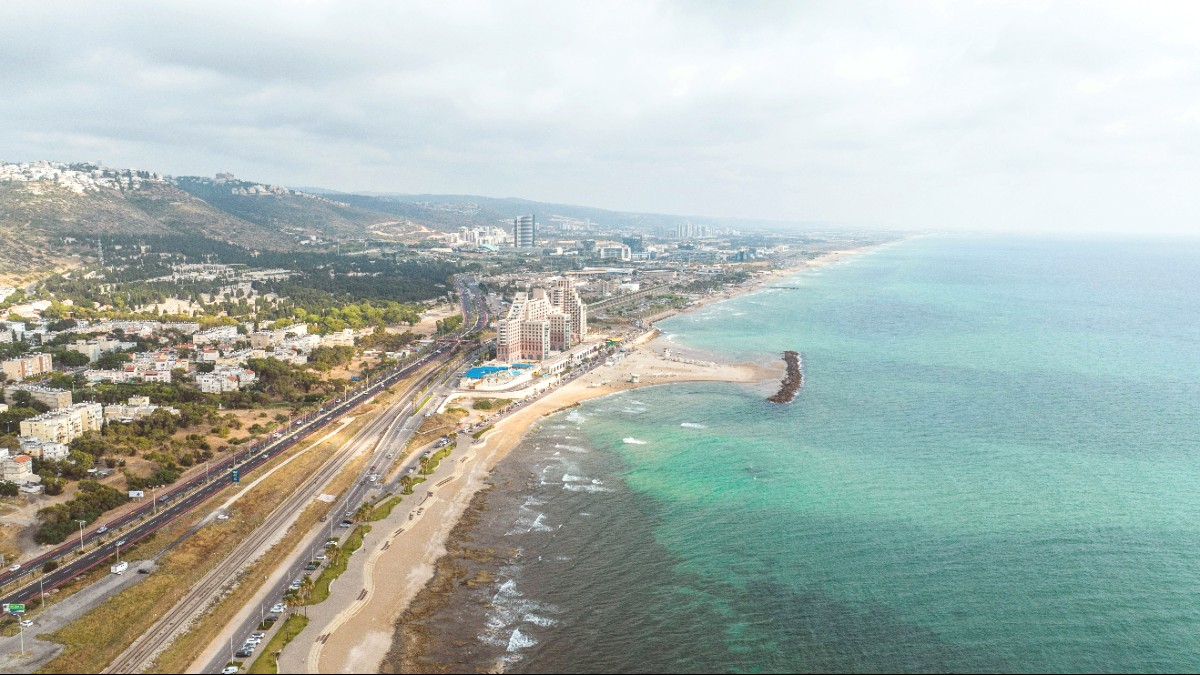
Mediterranean Coast, Israel And The Palestinian Territories
Haifa has a Mediterranean climate, with distinct seasons. Summer (June-September) brings hot, dry weather, with average temperatures from 25°C to 30°C (77°F to 86°F), often exceeding 30°C. Humidity can be high along the coast. Rainfall is rare.
Autumn (October-November) presents a pleasant change, with temperatures between 20°C and 25°C (68°F to 77°F). Humidity drops, making outdoor activities more comfortable. The first rains typically arrive in late October or November. Winter (December-March) is mild and wet, with temperatures from 10°C to 15°C (50°F to 59°F). Most annual rainfall occurs now. Spring (April-May) offers warm and pleasant weather, with temperatures rising from 18°C to 25°C (64°F to 77°F). Landscapes become lush and wildflowers bloom after winter rains.
Occasional heatwaves, known as "Sharav" or "Hamsin," may occur, notably in late spring and summer. These bring extremely hot, dry, and often dusty conditions, carried by winds from the desert. Take extra precautions against dehydration and heatstroke.
Stay indoors during the hottest parts of the day, drink plenty of fluids, and limit strenuous activity.
High temperatures, high humidity.
Long daylight hours, city life, ideal for beaches.
Crowded attractions, peak prices, heat fatigue.
Mild, pleasant temperatures.
Comfortable for walking, fewer crowds, blooming nature.
Occasional rain in late autumn, some holidays raise prices.
Mild, wet weather.
Lowest prices, minimal crowds, green landscapes.
Higher chance of rain, shorter daylight hours, some outdoor limits.
Israel grants visa-free entry for short tourist visits (up to 90 days) to citizens of many countries, including the United States, Canada, European Union member states, the United Kingdom, Australia, and New Zealand. For citizens of these countries, no advance visa application is necessary for tourism. Upon arrival, a tourist visa issues on the spot.
For nationalities that do need a visa for Israel, the application process goes through an Israeli embassy or consulate in your country of residence well before your planned travel date. The process may include submitting an application form, passport, photographs, and supporting documents. Visa requirements can change. Always check the official website of the Israeli Ministry of Foreign Affairs or your local Israeli embassy or consulate for the most current information before travel. This confirms updated requirements for your specific nationality.
Valid for at least six months beyond your departure.
Proof of confirmed return or onward ticket.
Demonstrate enough funds for your stay. Credit card and some cash are common.
Hotel reservations, hostel bookings, or invitation letter.
Upon arrival, receive a small blue paper entry permit. Keep it safe.
Haifa has a range of costs, from budget-friendly adventures to luxury getaways. Align your finances with your travel style.
The official currency of Israel is the Israeli New Shekel (ILS). Banknotes come in denominations of 20, 50, 100, and 200 Shekels. Coins are 10 agorot, ½ Shekel, 1 Shekel, 2 Shekels, 5 Shekels, and 10 Shekels. ATMs are widely available.
Tipping is customary for service industries. These are general guidelines.
These figures are approximate and subject to change.
Israel maintains high standards of public health and security.
No specific vaccinations are required for entry to Israel from most countries. Officials may require a Yellow Fever vaccination certificate if you arrive from a country with Yellow Fever transmission risk.
Consult a healthcare provider or a travel clinic at least 4-6 weeks before your trip for personalized advice based on your medical history and travel itinerary. Ensure your routine vaccinations (MMR, DTaP, Polio, Chickenpox, Flu) are up to date.
A concern in summer. Carry a Reusable water bottle; tap water is safe.
Stay hydrated and limit strenuous activity.
Avoid direct sun during peak hours.
UV index is high. Wear a Wide-brimmed hat.
Use Broad-spectrum sunscreen SPF 30+ regularly.
Do not rely solely on shade for protection.
Small cuts or scrapes may happen. Adventure Medical Kits.
Carry a Basic first aid kit with Band-aids and antiseptic.
Do not neglect small wounds.
| Category | Observation | Action |
|---|---|---|
| Crime Rate | Haifa generally has a low crime rate. | Exercise standard urban precautions. |
| Petty Crime | Pickpocketing can occur in crowded areas. | Keep valuables secure; use a Money belt or Pacsafe bag. |
| Night Safety | Poorly lit or deserted areas after dark. | Avoid walking alone in such areas. |